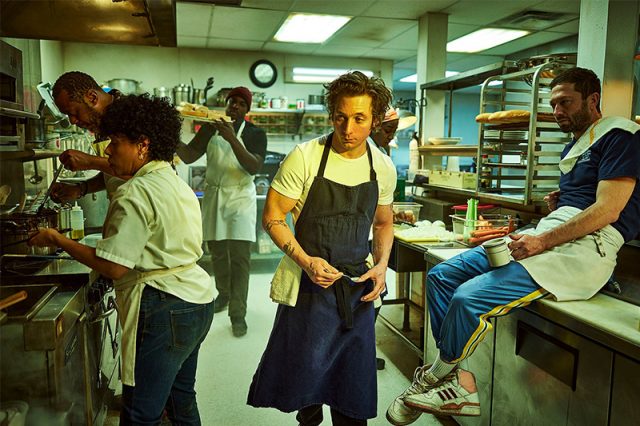You really want one of these bullshit stars? You’re gonna have to care about everything more than anything.
The sentiment described by The Bear’s Carmy (Jeremy Allen White) – an award-winning chef who returns home to run the family sandwich joint after his brother’s suicide – is a widely shared belief among top-flight chefs around the world. Elite kitchens run on passion.
The word “passion” is derived from the the Latin word “passio”, which involves bearing, enduring and generally suffering – both positively and negatively. Passion for elite chefs can mean feelings of intense enthusiasm or compelling desire for “everything more than anything”.
“Everything” here means the pillars of exceptional cuisine, such as highly prescriptive working practices to ensure the highest quality, discipline and standards. This legitimises suffering for one’s art. To suffer excessively without complaint is to be a special kind of person.
On the one hand, passionate chefs create space for boundless culinary excellence, extraordinary customer experiences and edible masterpieces so flawless that Michelin stars abound. On the other hand, impassioned, obsessive and abusive chefs suffer deeply in the pursuit of quality and consistency – and so do those around them.
In researching how chefs forge identities in elite kitchens, my colleagues and I found that implicit in kitchen work is isolation, abuse and violence – leading to what we term the “aesthetics of suffering”. This illustrates the generative qualities, virtues and even beauty of suffering and its association with resilient culinary professionals.
As one senior sous chef with three Michelin Stars told us, eerily mimicking Carmy:
We dedicate our whole life and sacrifice everything, absolutely everything, to put something that we are passionate about on a plate.
The Bear’s two seasons, however, don’t lean into the common idealization of this sort of passion. The show powerfully demonstrates that the love and artistry that goes into many plates can be as beautiful and creative as it is ugly and destructive. To suffer for art is laudable, but is it good?
Knowing how to suffer well
The Bear’s creators have achieved a nuanced and comprehensive representation of the experiences that elite chefs encounter. Themes of sacrifice and social isolation, such as the amount of time chefs spend at work, are depicted in the show. For instance, a kinetic scene ensues in the second season where Carmy deliberately gives his love interest Claire his phone number incorrectly.
Carmy describes Claire as “so great it scares the shit out of me”. Yet, his expression becomes flooded with sorrow: his eyes drop, his lip quivers and blood drains from his face. He knows he can never be with her because of his profession. In our study we describe this loss of contact with the “outside world” as a loss of humanity.
This propulsive show understands the total unwavering commitment that kitchen brigades feel. Our research, informed by interviews with 62 elite chefs, indicates that chefs work in the region of 12 to 20 hours per day. Such perceived commitment to their work translates to ideas of a strong and resilient professional that has to choose between having a family and doing a job they are really good at.
So is it really as stressful for these chefs as The Bear depicts? Yes chef, it really is.
In our research, we discovered that chefs do not get their accolades by taking it easy, or working in easy places. Instead, throughout their careers chefs described extreme acts of violence as assaults on their personhood, dignity and sense of worth or value.
Chefs subject themselves to many hardships, because, as one explained, this is believed to be the pathway to enlightenment; to put oneself in harsh situations where serious learning happens in order to reach a higher goal.
Our research revealed seriously traumatic events involving repetitive beatings, third degree burns, sexual assault and stabbings (for instance, with knives and temperature probes) – the last of which we see chef Sydney do to front-of-house manager Richie in the first series.
Poor mental health
It is unsurprising, then, that many people working in elite kitchens suffer from poor mental health. This is a recurring theme throughout The Bear which reaches a sort of apex in the final episode of the second season.
Here Carmy gets locked in the walk-in refrigerator leaving Sydney to run service. Carmy’s mental state unravels as he recalls his mental abuse: “You’re terrible at this … you are bullshit .. you should be dead.” These reflexive moments speak to the bullying that chefs endure and the toll it takes on their mental health.
Later in the episode Sydney vomits at the end of service. Depictions of these bodily responses matter. Our studies indicate that for chefs, the body assumes that it’s going to war. Before starting work, chefs reported vomiting and/or diarrhoea prior to doing a 19 to 20 hour shift.
I started researching top-flight chefs in 2016 because my younger brother is an elite chef. He has witnessed brutal assaults in Michelin kitchens, one of which involved a police arrest mid-service.
Like many of the stories the chefs who spoke to us shared, much of the violence my brother recounted could not be published. He now runs a successful restaurant in Bath. He was Carmy. However, he had a daughter with his “Claire”, because in order to have a life beyond the kitchen, my brother had to change his everything.
Rebecca Scott, Senior Lecturer in Marketing and Strategy, Cardiff University
This article is republished from The Conversation under a Creative Commons license. Read the original article.










